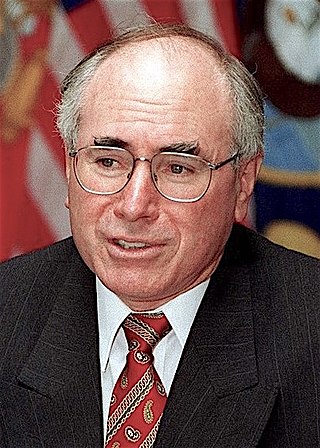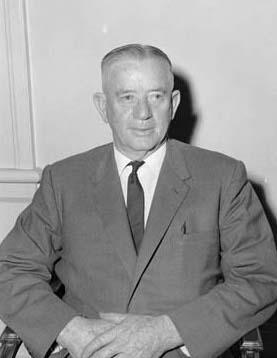
The 1996 Australian federal election was held to determine the members of the 38th Parliament of Australia. It was held on 2 March 1996. All 148 seats of the House of Representatives and 40 seats of the 76-seat Senate were up for election. The centre-right Liberal/National Coalition led by Opposition Leader John Howard of the Liberal Party and coalition partner Tim Fischer of the National Party defeated the incumbent centre-left Australian Labor Party government led by Prime Minister Paul Keating in a landslide victory.

Lance Herbert Barnard AO was an Australian politician and diplomat. He was the deputy leader of the Australian Labor Party (ALP) from 1967 to 1974 and held senior ministerial office in the Whitlam Government, most notably as Deputy Prime Minister of Australia from 1972 to 1974.

The Division of Bass is an Australian electoral division in Tasmania.
This is a list of members of the Australian House of Representatives of the 29th Parliament of Australia (1974–1975) as elected on 18 May 1974. It convened on 12 June 1974, and ended on 11 November 1975. On 18 May 1974 a double dissolution of both Houses was held. All 127 seats in the House of Representatives, and all 60 seats in the Senate were up for election. The incumbent Australian Labor Party led by Prime Minister of Australia Gough Whitlam defeated the opposition Liberal Party of Australia led by Billy Snedden and Coalition partner the Country Party led by Doug Anthony.

The Division of Mayo is an Australian electoral division located to the east and south of Adelaide, South Australia. Created in the state redistribution of 3 September 1984, the division is named after Helen Mayo, a social activist and the first woman elected to an Australian University Council. The 9,315 km² rural seat covers an area from the Barossa Valley in the north to Cape Jervis in the south. Taking in the Adelaide Hills, Fleurieu Peninsula and Kangaroo Island regions, its largest population centre is Mount Barker. Its other population centres are Aldgate, Bridgewater, Littlehampton, McLaren Vale, Nairne, Stirling, Strathalbyn and Victor Harbor, and its smaller localities include American River, Ashbourne, Balhannah, Brukunga, Carrickalinga, Charleston, Cherry Gardens, Clarendon, Crafers, Cudlee Creek, Currency Creek, Delamere, Echunga, Forreston, Goolwa, Gumeracha, Hahndorf, Houghton, Inglewood, Kersbrook, Kingscote, Langhorne Creek, Lobethal, Macclesfield, McLaren Flat, Meadows, Middleton, Milang, Mount Compass, Mount Pleasant, Mount Torrens, Mylor, Myponga, Normanville, Norton Summit, Oakbank, Penneshaw, Piccadilly, Port Elliot, Second Valley, Springton, Summertown, Uraidla, Willunga, Woodchester, Woodside, Yankalilla, and parts of Birdwood, Old Noarlunga and Upper Sturt.

The Division of Makin is an electoral division for the Australian House of Representatives located in the northeastern suburbs of Adelaide. The 130 km² seat covers an area from Little Para River and Gould Creek in the north-east to Grand Junction Road in the south and Port Wakefield Road in the west, including the suburbs of Banksia Park, Fairview Park, Golden Grove, Greenwith, Gulfview Heights, Ingle Farm, Mawson Lakes, Modbury, Para Hills, Para Vista, Pooraka, Redwood Park, Ridgehaven, Salisbury East, Salisbury Heights, St Agnes, Surrey Downs, Tea Tree Gully, Valley View, Vista, Walkley Heights, Wynn Vale, Yatala Vale, and parts of Gepps Cross and Hope Valley.

The Division of Solomon is an Australian Electoral Division in the Northern Territory. It is largely coextensive with the Darwin/Palmerston metropolitan area. The only other division in the territory, the Division of Lingiari, covers the remainder of the territory.

The Liberal National Party of Queensland (LNP) is a major political party in Queensland, Australia. It was formed in 2008 by a merger of the Queensland divisions of the Liberal Party and the National Party. At a federal level and in most other states, the two parties remain distinct and operate as a Coalition. The LNP is a division of the Liberal Party of Australia, and an affiliate of the National Party of Australia.
Kevin Eugene Newman AO was an Australian soldier and politician. He was a member of the Liberal Party and held ministerial office in the Fraser Government, serving as Minister for Repatriation (1975–1976), Environment, Housing and Community Development (1976–1977), National Development (1977–1979), Productivity (1979–1980), and Administrative Services (1980–1983). He represented the Tasmanian seat of Bass in the House of Representatives from 1975 to 1984. His wife Jocelyn also became a federal government minister, while his son Campbell became premier of Queensland.

The 1992 Tasmanian state election was held on 1 February 1992 in the Australian state of Tasmania to elect 35 members of the Tasmanian House of Assembly. The election used the Hare-Clark proportional representation system — seven members were elected from each of five electorates. The quota required for election was 12.5% in each division.
State elections were held in South Australia on 11 December 1993. All 47 seats in the South Australian House of Assembly were up for election. The incumbent Australian Labor Party led by Premier of South Australia Lynn Arnold was defeated by the Liberal Party of Australia led by Leader of the Opposition Dean Brown. The Liberals won what is still the largest majority government in South Australian history.
The Playmander was a gerrymandering system, a pro-rural electoral malapportionment in the Australian state of South Australia, which was introduced by the incumbent Liberal and Country League (LCL) government in 1936, and remained in place for 32 years until 1968.

State elections were held in South Australia on 17 September 1977. All 47 seats in the South Australian House of Assembly were up for election. The incumbent Australian Labor Party led by Premier of South Australia Don Dunstan won a fourth term in government, defeating the Liberal Party of Australia led by Leader of the Opposition David Tonkin.

State elections were held in South Australia on 12 July 1975. All 47 seats in the South Australian House of Assembly were up for election. The incumbent Australian Labor Party led by Premier of South Australia Don Dunstan won a third term in government, defeating the Liberal Party of Australia led by Leader of the Opposition Bruce Eastick.

State elections were held in South Australia on 6 March 1965. All 39 seats in the South Australian House of Assembly were up for election. The incumbent Liberal and Country League led by Premier of South Australia Thomas Playford IV, in power since 1938, was defeated by the Australian Labor Party led by Leader of the Opposition Frank Walsh.

Elections to the 49th Parliament of New South Wales were held on Saturday 19 March 1988. All seats in the Legislative Assembly and a third of the seats in the Legislative Council were up for election. The Labor government of Premier Barrie Unsworth was defeated by the Liberal-National Coalition, led by Opposition Leader Nick Greiner.

A general election was held in the state of New South Wales, Australia, on Saturday 7 October 1978. The result was a landslide victory for the Labor Party under Neville Wran, popularly known as the "Wranslide."

The 2002 Cunningham by-election was held in the Australian electorate of Cunningham in New South Wales on 19 October 2002. The by-election was triggered by the resignation of the sitting member, the Australian Labor Party's Stephen Martin on 16 August 2002. The writ for the by-election was issued on 16 September 2002.

State elections were held in South Australia on 29 April 1944. All 39 seats in the South Australian House of Assembly were up for election. The incumbent Liberal and Country League government led by Premier of South Australia Thomas Playford IV defeated the opposition Australian Labor Party led by Leader of the Opposition Robert Richards.

The Liberal Party of Australia (South Australian Division), commonly known as the South Australian Liberals, is the South Australian Division of the Liberal Party of Australia. It was formed as the Liberal and Country League (LCL) in 1932 and became the South Australian Division of the Liberal Party when the Liberal Party was formed in 1945. It retained its Liberal and Country League name before changing to its current name in 1974. It is one of two major parties in the bicameral Parliament of South Australia, the other being the Australian Labor Party (SA Branch). The party has been led by Leader of the Opposition David Speirs since the 2022 state election after a one-term government.














